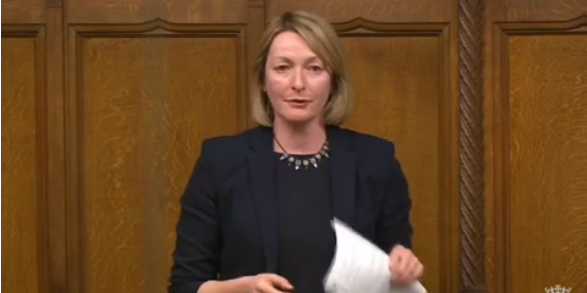Jessica Morden Jessica Morden - Labour MP for Newport East, PPS to Keir Starmer and Shadow Minister for Wales
Last night I had the chance to speak about Llanwern in a debate on UK Steel.

I have copied the speech below.
Hansard
As I make my contribution, I am mindful of the fact that steelworkers in my constituency will soon find out whether they still have a job, because the consultants doing the job matching will soon finish their work. Up to 750 jobs will be lost in south Wales, with the losses in Llanwern, in my constituency, very much wrapped up in the announcement of the job losses at Port Talbot. Although the Tata press release talked about Port Talbot, it is hugely important to workers and their families in Newport, not to mention in the wider economy, that we remember Llanwern, because the effects are being keenly felt there.
Before the debate, I asked Newport steelworkers what comments they would like me to make to the Minister-I know other hon. Members do that before steel debates-and they said, “Please just keep saying what you said last time: that our industry needs help now. Please remind the Government that we are here.”
Time and time again, we have come to this Chamber asking for real action from the Government for the steel industry, but despite the debates, the questions and the summits, the industry and the unions tell us that not enough tangible progress has been made. That message came out loud and clear from the recent Welsh Affairs Committee hearing on the problems in the steel industry in Wales. In evidence to the Committee, Tata’s director of strip products, Stuart Wilkie, talked about the three things the business needed to survive in Wales and counteract the perfect storm it faces: increased efficiency, reduced costs and Government support.
On efficiencies, Tata has already made major inroads into downsizing the business’s production capacity, and my constituents know only too well the effect that that has had, be that on the pickle line or the mothballed hot mill.
We have seen the reduction of costs over the years in Newport, including job losses, as Llanwern has reduced in size. Only last year there were 97 contractors on site, and now they have gone. We must remember that behind every job loss figure is an individual and a family.
On the third element-the support the industry gets from the Welsh Government and the UK Government-the Welsh Government taskforce has been well received. It is proactive, and it is welcome that there is a voice for steelworker representatives. The taskforce does what it can with the levers it has at its disposal. From the Welsh Affairs Committee session, I know that Tata and the unions say that the dialogue with the Welsh Government and the assistance from them are exceptionally good.
In the case of Westminster, the industry says that there has been progress, but it has not been speedy enough, and there has been little bottom-line impact so far. We have had to take the job losses and the efficiencies, but we need tangible help to make sure that there is a strong plan to move us through the next two years. I cannot reiterate enough that that really matters for flex plants such as Llanwern.
On energy, companies will not see the money from phase 2 of the energy-intensive industries package until March, and they have waited two years for action. On dumping, the Government say they are doing something, and they are making supportive noises, yet they oppose the scrapping of the lesser duty rule, as we have heard many times today, and they support the granting of market economy status to China.
On procurement, more could be done to bring the Government together with companies to find out what is needed and how it can be supplied. Good work is going on in infrastructure projects in Wales. The Government say they have produced their guidance, but, as my hon. Friend the Member for Wallasey (Ms Eagle) asked, what practical impact has it had so far? The message repeated relentlessly at the Welsh Affairs Committee hearing was the need for more speed and more action, and the need to monitor our industry for the longer term to try to see what is coming-to anticipate and look ahead.
Steelworkers in my constituency have seen major restructuring over the years, and I know of the under- standable fear, worry and concern that that breeds. As my hon. Friend said, our steel communities are looking to the Government in this hour of need. The Government need to put their warm, sympathetic words into action, because those working in steel feel that they have been far too slow to act. On behalf of the workers in my constituency, I call on the Government to support the steel industry far more proactively in the Budget.
If you want to read more of the debate you can here
